You are hereBlogs / WcP.Observer's blog / Web goes on strike, Jan. 18, 2012 - Internet blackout to stop SOPA and PIPA: "guilty until proven innocent"?
Web goes on strike, Jan. 18, 2012 - Internet blackout to stop SOPA and PIPA: "guilty until proven innocent"?
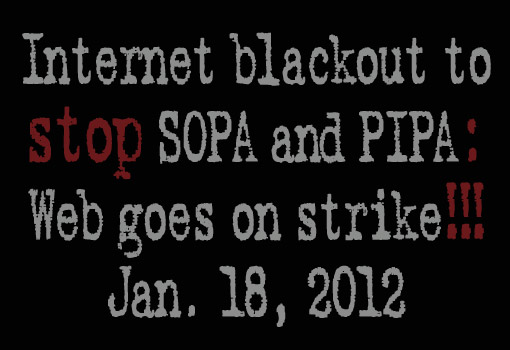


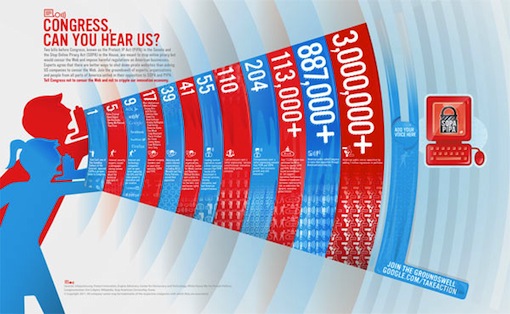
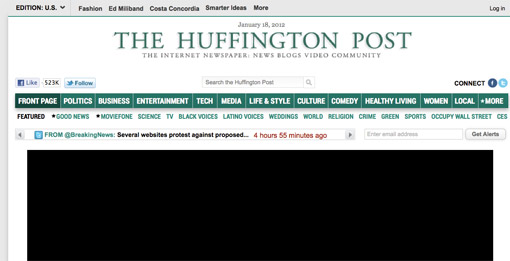
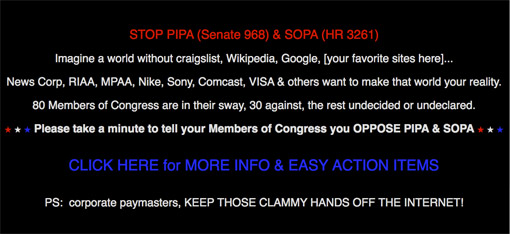
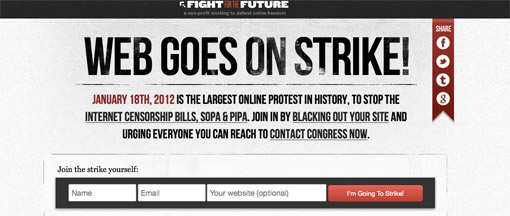
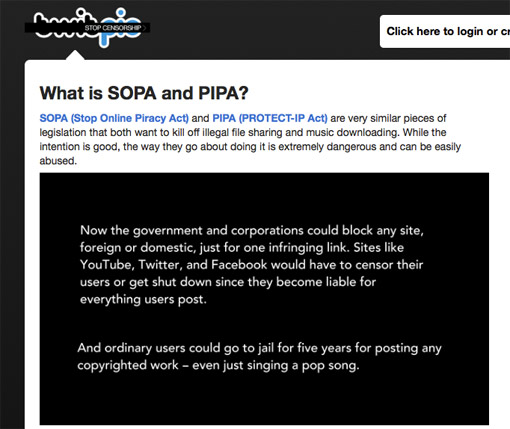







(quote)
How SOPA would affect you: FAQ
When Rep. Lamar Smith announced the Stop Online Piracy Act in late October, he knew it was going to be controversial.
But the Texas Republican probably never anticipated the broad and fierce outcry from Internet users that SOPA provoked over the last few months. It was a show of public opposition to Internet-related legislation not seen since the 2003 political wrangling over implanting copy-protection technology in PCs, or perhaps even the blue ribbons appearing on Web sites in the mid-1990s in response to the Communications Decency Act.
Tumblr's virtual call to arms against SOPA during last week's U.S. House of Representatives hearing.
As CNET reported in December, Smith, a self-described former ranch manager whose congressional district encompasses the cropland and grazing land stretching between Austin and San Antonio, Texas, has become Hollywood's favorite Republican. The TV, movie, and music industries are the top donors to his 2012 campaign committee, and he's been feted by music and movie industry lobbyists at dinners and concerts.
To learn how SOPA, and its Senate cousin known as the Protect IP Act, would affect you, keep reading. CNET has compiled a list of frequently asked questions on the topic:
Who supports SOPA?
The three organizations that have probably been the most vocal are the MPAA, the Recording Industry Association of America, and the U.S. Chamber of Commerce. A Politico chart shows that Hollywood has outspent Silicon Valley by about tenfold on lobbyists in the last two years. Here's a CNET article on why the Chamber is so pro-SOPA.
Who's opposed to SOPA?
Much of the Internet industry and a large percentage of Internet users. Here's the most current list (PDF) of opponents.
On November 15, Google, Facebook, Twitter, Zynga, eBay, Mozilla, Yahoo, AOL, and LinkedIn wrote a letter to key members of the U.S. Senate and House of Representatives, saying SOPA poses "a serious risk to our industry's continued track record of innovation and job creation, as well as to our nation's cybersecurity." Yahoo has reportedly quit the U.S. Chamber of Commerce over the organization's enthusiastic support for SOPA.
The European Parliament adopted a resolution last week stressing "the need to protect the integrity of the global Internet and freedom of communication by refraining from unilateral measures to revoke IP addresses or domain names." Rep. Nancy Pelosi, the House Democratic leader, said in a message on Twitter last week that we "need to find a better solution than #SOPA."
A letter signed by Reps. Zoe Lofgren and Anna Eshoo, both California Democrats, and Rep. Ron Paul, the Republican presidential candidate from Texas, predicts that SOPA will invite "an explosion of innovation-killing lawsuits and litigation." Law professors have also raised concerns. And yes, there is a protest song.
How would SOPA work?
It allows the U.S. attorney general to seek a court order against the targeted offshore Web site that would, in turn, be served on Internet providers in an effort to make the target virtually disappear. It's kind of an Internet death penalty.
More specifically, section 102 of SOPA says that, after being served with a removal order:
A service provider shall take technically feasible and reasonable measures designed to prevent access by its subscribers located within the United States to the foreign infringing site (or portion thereof) that is subject to the order...Such actions shall be taken as expeditiously as possible, but in any case within five days after being served with a copy of the order, or within such time as the court may order.
How is SOPA different from the earlier Senate bill called the Protect IP Act?
Protect IP targeted only domain name system providers, financial companies, and ad networks--not companies that provide Internet connectivity. Because SOPA is broader, even some companies who liked, or at least weren't vocally opposed to, the Senate bill aren't exactly delighted with the House version.
*Update Jan. 18, 2012*
Google says 4.5 million people signed anti-SOPA petition today
When Google speaks, the world listens. And today, when Google asked its users to sign a petition protesting two anti-piracy laws circulating in Congress, millions responded.
A spokeswoman for Google confirmed that 4.5 million people added their names to the company's anti-SOPA petition today.
The petition, which was available via a link from Google's homepage, states that although fighting online piracy is important, the plan of attack described in the SOPA and PIPA bills would be ineffective.
"There’s no need to make American social networks, blogs and search engines censor the Internet or undermine the existing laws that have enabled the Web to thrive, creating millions of U.S. jobs," the petition reads. "Too much is at stake -– please vote NO on PIPA and SOPA."
The search engine frequently delights users by toying with its homepage logo, but on Wednesday it did something it had never done before: it blocked out its logo completely. A link below the blackout read "Tell Congress: Please don't censor the web!" and lead to a page with the petition.
Of course, Google's anti-SOPA and PIPA petition is not the only one out there on this day of mass online protest. As of this writing 1.458 million people signed a similar petition at the activist website Avaaz.org, and Fight for the Future said that between its two sites, Sopastrike.com and AmericanCensorship.org, at least 350,000 people have sent emails to representatives in the House and Senate.
A graphic put out by Google shows that before today's coordinated protests, 3 million Americans had signed various petitions against the two bills.
In other SOPA number news, a spokeswoman from the popular blogging platform WordPress, said that at last count, 25,000 WordPress blogs had joined the SOPA and PIPA protest by blacking out their blogs entirely, and another 12,500 used the "Stop Censorship" ribbon.
Today, the White House Blog reports that 103,785 people signed petitions through the We The People website asking the president to protect a free and open Internet.
*Update Jan. 19, 2012*
SOPA Protests Sway Congress: 31 Opponents Yesterday, 122 Now
Yesterday the Internet cried out in protest of SOPA-PIPA, and congress heard us loud and clear. At the beginning of Janaury 18th, there were 80 members of congress who supported the legislation, and 31 opponents. Now, just 63 support SOPA-PIPA, and opposition has surged to 122, according to ProPublica.
Unfortunately, there are still more stated supporters than opponents in the Senate. There, PIPA needs 60 supporters out of 100 for it to pass, and two-thirds majority (67 votes) to prevent President Obama from being able to veto. At this rate PIPA would pass.
ProPublica, an independent non-profit news room define supporters and opponents according to "whether a member is a sponsor of the proposed bills, and each member’s voting record on the current bills' precursors and alternatives." It's been keeping a real-time count of Congressional support and opposition.
Prior to the protests, many Congress members hadn’t declared their position. In response to educational efforts and opinion of their constituents, many have now come out as opponents. Meanwhile, some supporters have changed their minds.
Here are ProPublica’s SOPA support and opposition breakdowns as of 5:15 pm PST, January 19th.
* Total: 63 supporters, 122 opponents
* Senate: 37 supporters, 22 opponents
* House: 26 supporters, 100 opponents
* Democrats (across the Senate and House): 40 supporters, 55 opponents
* Republicans (across the Senate and House): 22 supporters, 67 opponents
Some other key facts:
* Both of California’s Senators support SOPA-PIPA, likely due to ties to the entertainment industry. Thankfully more California House members oppose it than support it.
* 25 of the 37 Senate supporters are Democrat
* Opponents tend to be younger, especially in the house. So yes, old people don’t understand the internet.
If the current ratio of supporters to opponents holds, PIPA would receive 62 votes in the Senate and pass. Even if Obama would still have the power to veto it, this means our work isn’t done. Use the Electronic Frontier Foundations ‘Strike Against Censorship’ page to call or email your representatives.
*Updated: Jan. 20, 2012*
SOPA Protests Sway Congress: 31 Opponents on Jan 18; 122 on Jan 19; Unfortunately, there are still more stated supporters than opponents in the Senate. There, PIPA needs 60 supporters out of 100 for it to pass, and two-thirds majority (67 votes) to prevent President Obama from being able to veto. At this rate PIPA would pass Yesterday the Internet cried out in protest of SOPA-PIPA, and congress heard us loud and clear. At the beginning of Janaury 18th, there were 80 members of congress who supported the legislation, and 31 opponents. Now, just 63 support SOPA-PIPA, and opposition has surged to 122, according to ProPublica.
Unfortunately, there are still more stated supporters than opponents in the Senate. There, PIPA needs 60 supporters out of 100 for it to pass, and two-thirds majority (67 votes) to prevent President Obama from being able to veto. At this rate PIPA would pass.
(unquote)
Image courtesy Google



















It was a big strike, I live in Texas & I also witness that how that day Internet blackout to stop SOPA and PIPA.